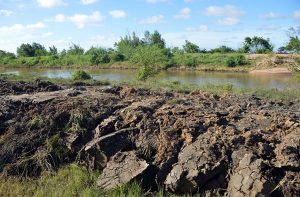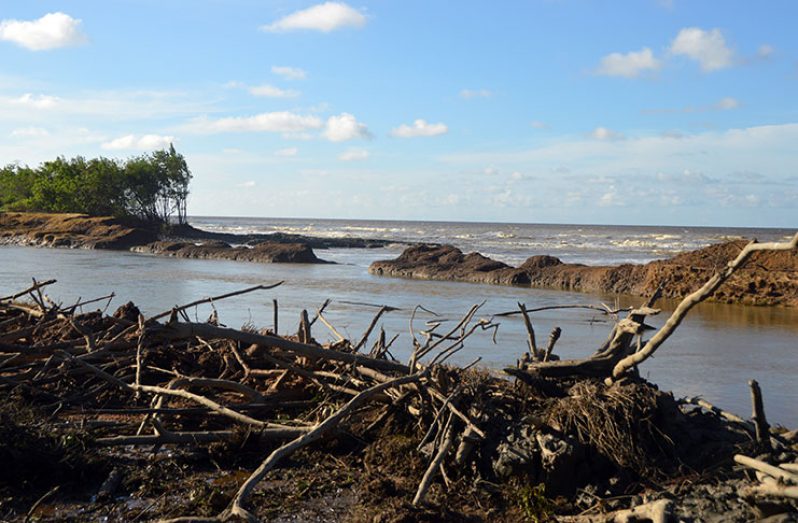…as govt continues work to repair sea breach
Mahaicony farmers affected by the flooding of their farmlands, due to severe erosion of the earthen embankment meant to keep out the Atlantic Ocean, are holding fast as the Government takes swift action to rectify the situation.
Due to recent heavy rainfalls and raging waters, embankments at Broomhall, Danzigt and Prospect in Mahaicony have been breached. Most notable is the 125 metres beach of earth dam at Danzigt which serve as barriers to the Bellamy Canal from the Atlantic Ocean.

With the barrier now broken in some areas, neighbouring farmlands have experienced flooding which can prove detrimental to crops. On Monday, the Guyana Chronicle visited the Danzigt location and spoke to several farmers who are collaborating with the Ministry of Public Infrastructure, the National Drainage and Irrigation Authority (NDIA) and other agencies to remedy the situation.
Proprietor of 65 acres of land in the location, Romeo Machado, told the newspaper that 40 acres of his land is being used for crops while the remainder is being used for cattle rearing. However, the spill-over of salt water into the Danzigt trench is not only affecting his rice crops but preventing access to suitable drinking water for his some 40-head of cattle.
“Really and truly it’s this water and this trench [the cattle] depend on because they can’t drink salt water and once that place broke away it’s salt water that has been coming in,” he said.
He is aware that the water has a high salt content because it was tested by experienced personnel earlier in the day.

Machado said that the Danzigt trench leads all the way to the Bellamy Canal and then on to the Mahaica Creek which means that, if salt water continues to infiltrate the fresh water source, everyone dependent on it will be affected. “What they [the Ministry] is trying to do is to block the trench off and see [to do] as much as they can do. For now, they’re trying to build an inside dam,” he said.
On Sunday, Chief Sea and River Defence Officer, Kevin Samad had told the media that a long boom excavator was mobilized on July 06 to assist rice farmers with the reinforcement of the dams around their rice fields.
The dams serve as secondary barriers to the earthen embankments — now eroded at some sections. The earthen embankment has also experienced a loss of large stretches of mangrove forest which previously served as natural defences against rising sea level.
The erosion cycle at the Mahaicony area has also been attributed to a loss of large stretches of mangrove forest thereby also losing its natural defences against the raging tide and rising sea level.

Machado is pleased that the reinforcement of the dams is being done free of cost by the government, as this would have cost farmers an additional “fortune”. Although only a portion of his farmland is affected, he understands that if action isn’t taken quickly, more damage will be done.
“If this isn’t fixed in a very fast time, we’re going to lose everything,” Machado said.
“When the water comes on the land its means that [for] two-three years that land has to remain like that before you can go there and say you’re going to plant rice [because] it won’t grow [because] salt is on the land.”

Samad told the media on Sunday that some 2000 tons of boulders have already been delivered to vulnerable sections at the areas for placement along the sea dam.
Another 1000 tons of boulders will be delivered on Wednesday at the breached section at Danzigt to keep the intense Atlantic at bay while a tender was opened on July 02, 2019 for the supply of 2,500 tons more.
On July 09, 2019, the Ministry of Public Infrastructure will open a tender at the National Procurement and Tender Administration Board (NPTAB) for the construction of 350 metres of riprap structure between Prospect and Broomhall. This marks Phase 2 of a project previously commenced with the awarding of a contract for the construction of 325 metres of riprap structure as Phase 1. The total length of construction between Prospect and Broomhall is 675 metres or over 1,200 feet of works.
There are also talks amongst official about clearing of a separate section of land for the catchment of freshwater to provide for the needs of the farmers.
HOLDING FAST
Speaking with another farmer, Bernard Baker, who has cultivated 45 acres rice on his portion of land, he said that he sees that action is being taken by the government.
“They’re working as fast as they could. We have to wait on the boulders to come and block the [the eroded area] because no mud or anything can’t block it. A lot of people [from the Ministry] went down there to see what it is and everybody is trying their best to see how fast they can act.”, he said.
Another farmer, Mr. Rajin, expressed the concern of not being able to farm, for at least a

year, on his portion of land affected by the salt water.
However, he indicated planting cash crops will serve as an alternative for him to provide a livelihood for his family. He estimated that some $2M would be lost from the rice he cultivated.
According to Machado, this is the first time that his farmland has been affected to this extent and he believes the incident can only be attributed to the fierceness of Mother Nature. “To be honest, I have to say its Mother Nature because [although] this canal and the dam is there to block the water, there was a sea bank there with some shells built up there and when Mother Nature decided to take toll, it’s the trees, everything, everything coming in,” he said.
PERMANENT FIX
He believes that a permanent fix, though expensive, can prevent erosion from affecting the area again.

“They got to get sheet pile, plant it down and, if possible, you will get some boulders at the back to break the current of the water and the steel pile is going to prevent the water from coming over. That is the only alternative and that is a lot of money,” he said, adding: “A lot of them were here last week…they’re doing whatever they can do but anything you do you have to get money.”
Meanwhile, Machado urges the Ministry to organise greater monitoring measures to ensure that hired contractors do the works they are being paid to do and, in an efficient manner.



.jpg)








